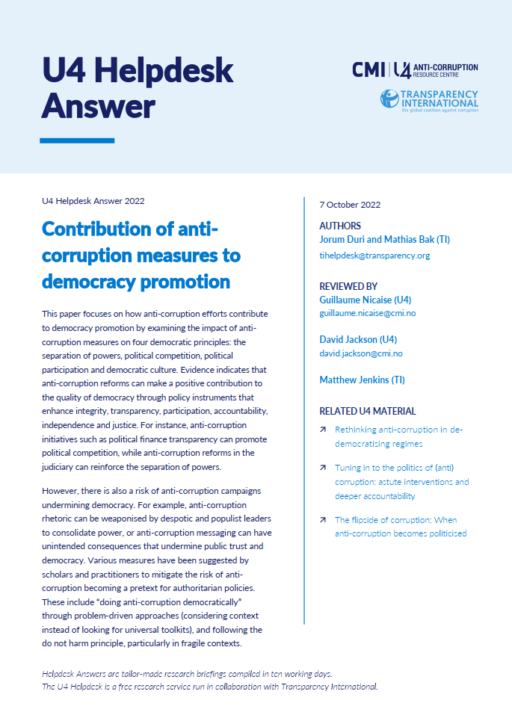
This Anti-Corruption Helpdesk brief was produced in response to a query from a U4 Partner Agency. The U4 Helpdesk is operated by Transparency International in collaboration with the U4 Anti-Corruption Resource Centre based at the Chr. Michelsen Institute.
Query
Please provide an overview of how anti-corruption contributes to democracy promotion and protection, particularly in the following overarching democratic principles: a) division of powers, b) political competition, c) democratic culture, d) political participation. What are the risks of anti-corruption campaigns undermining democracy and are there any possible ways to address these risks?
Summary
This paper focuses on how anti-corruption efforts contribute to democracy promotion by examining the impact of anti-corruption measures on four democratic principles: the separation of powers, political competition, political participation and democratic culture. Evidence indicates that anti-corruption reforms can make a positive contribution to the quality of democracy through policy instruments that enhance integrity, transparency, participation, accountability, independence and justice. For instance, anti-corruption initiatives such as political finance transparency can promote political competition, while anti-corruption reforms in the judiciary can reinforce the separation of powers.
However, there is also a risk of anti-corruption campaigns undermining democracy. For example, anti-corruption rhetoric can be weaponised by despotic and populist leaders to consolidate power, or anti-corruption messaging can have unintended consequences that undermine public trust and democracy. Various measures have been suggested by scholars and practitioners to mitigate the risk of anti-corruption becoming a pretext for authoritarian policies. These include “doing anti-corruption democratically” through problem-driven approaches (considering context instead of looking for universal toolkits), and following the do not harm principle, particularly in fragile contexts.
Contents
- Background: Understanding the relationship between corruption and democracy
- The contribution of anti-corruption efforts to democracy
- Anti-corruption and democratic culture
- Anti-corruption and political participation
- Anti-corruption and political competition
- Anti-corruption and the separation of power
- Risks of anti-corruption campaigns to democracy
- Approaches to mitigate risks of anti-corruption to democracy
- References
Main points
- Corruption is understood as a driver of democratic decline, lowering public trust in government, prejudicing sound policymaking to favour private interests, as well as leading to the capture of accountability mechanisms and oversight bodies.
- Anti-corruption reforms in the judiciary and parliamentary development programmes are examples of how anti-corruption may deepen the principle of separation of power.
- Anti-corruption initiatives such as political finance transparency and integrity safeguards in elections promote political competition.
- Risks of anti-corruption to undermine democracy include its weaponisation by despotic and populist leaders to consolidate power, as well as unintended consequences of anti-corruption messages that undermine democratic values.
Authors
Jorum Duri and Mathias Bak
Reviewers
Guillaume Nicaise (U4)
David Jackson (U4)
Matthew Jenkins (Transparency International)
Date
18/11/2022

